Updates to PSLE scoring: Foundation level grades unveiled, P5 2020 cohort to get report cards with new grade bands
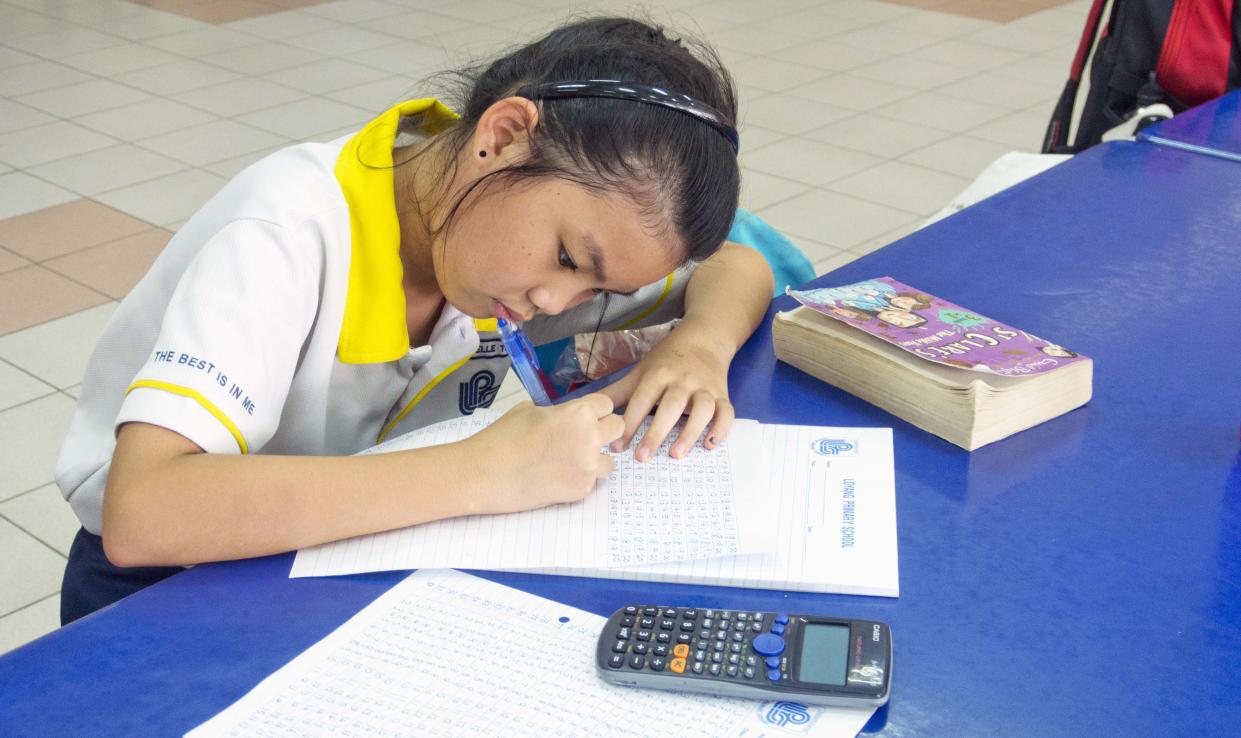
SINGAPORE — Under the new Primary School Leaving Examination (PSLE) grading system, scheduled to take effect from 2021, pupils taking subjects at the Foundation level will be assessed under three scoring bands instead of five.
To derive a PSLE score, the new A to C bands for these subjects will be pegged to the corresponding Achievement Level (AL) grades of 6 to 8 for Standard level subjects.
The subject-based banding was introduced in 2008, allowing Primary 5 students to take a combination of subjects at two difficulty levels: Standard or Foundation. About 10 per cent - or 4,000 students - of the yearly PSLE cohort take one or more Foundation level subjects.
In a media statement released on Wednesday (24 July), the Ministry of Education (MOE) said, “This pegging reflects the fact that the curriculum of a Foundation level subject is a subset of the Standard level subject, and the assessment load at the Foundation level is less demanding when compared against the Standard level.”

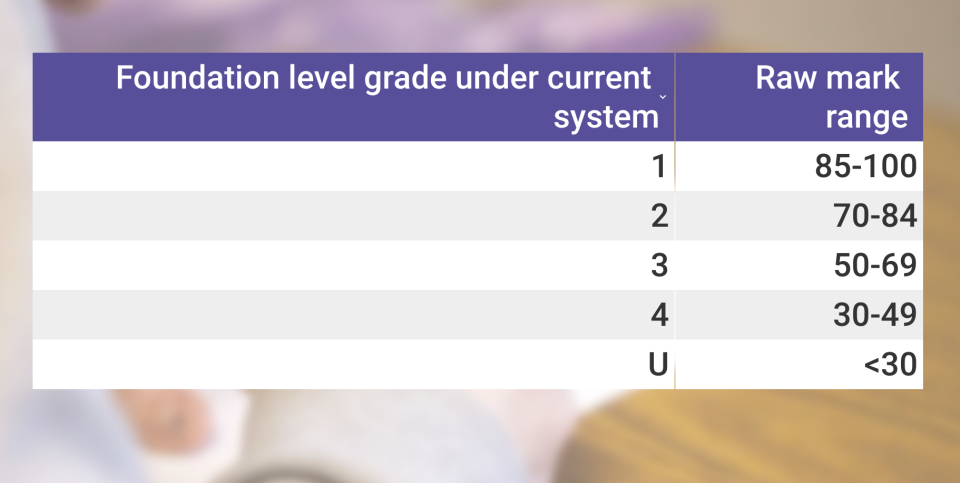
The new PSLE grading system, which was first announced in 2016, will convert the students’ marks into grade bands 1 to 8 for Standard level subjects. A student’s PSLE score will be a sum of his grades in all four subjects.
This new system will replace the current aggregate T-score system, in which students are graded relative to their peers. With only 29 possible PSLE scores under it, compared with more than 200 possible T-score aggregates under the current system, this would mean that students will not be as finely differentiated, said the MOE.

Under the new system, the best score a student can get if he takes all his four subjects at Standard level is 4. Correspondingly, the best score that a student taking one Foundation level subject can get is 9.
Wong Siew Hoong, MOE’s director-general of education, stressed that the higher AL grades for Foundation Level subjects should not deter parents, whose children need a “different pace of study” suitable for them, from allowing them to take up these subjects.
“We do hope that parents and students - with the advice and guidance from schools and teachers who would be working with them - would make right educational choices,” he said.
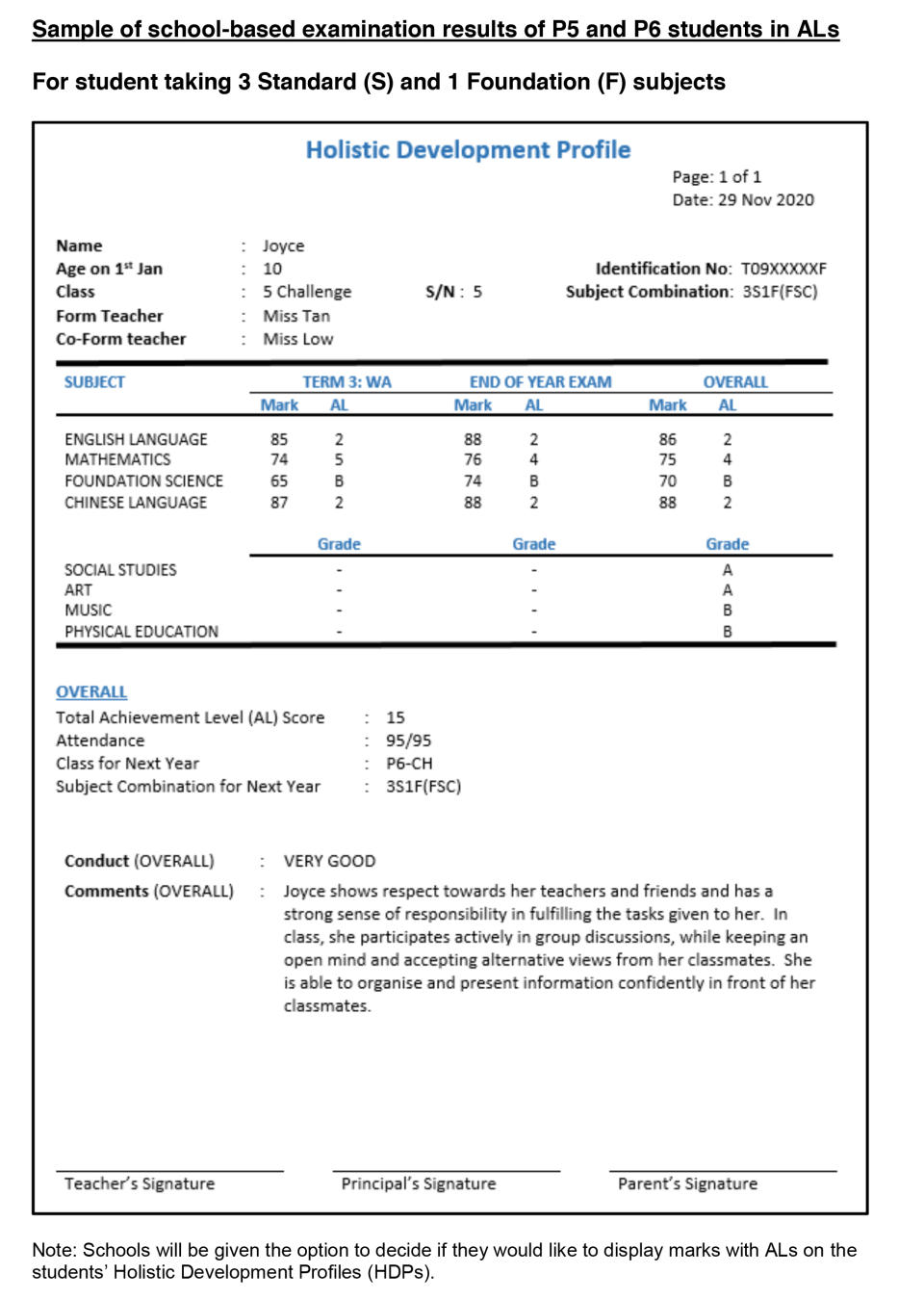
Primary schools to present exams in AL grade bands from 2020
In a bid to familiarise students and parents with the new system, Primary 5 and 6 pupils will receive school-based examination report cards in AL grade bands, instead of grades A* to U, beginning from next year’s Primary 5 cohort.
The MOE will also be providing information on each school’s indicative cut-off point based on the new system in the first half of 2021.
The ministry said that these cut-off points will be derived from the PSLE scores and choice patterns of next year’s Secondary 1 posting exercise.
It added that this will guide students and parents undergoing the new system to make “informed choices” while selecting secondary schools.
Students who score between 4 and 20 will be eligible for the Express stream. Those with higher scores may be placed in two other streams: Normal (Academic) and Normal (Technical).
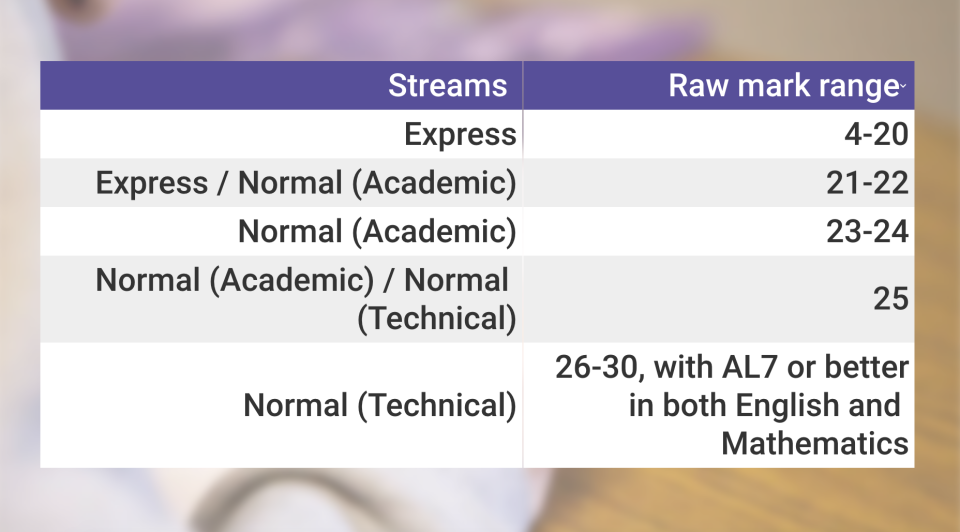
The three streams, together with their labels, will be phased out and be replaced with subject-based banding by 2024.
Posting will continue to be based on academic merit first, but under the new system, the choice order in which a student lists his secondary schools will be a new tie-breaker. Schools listed higher in a students’ choice list will be prioritised.
Eligibility for taking higher mother-tongue language subjects
Students will be eligible to take higher mother-tongue language subjects in secondary school if:
they receive a PSLE score of 8 or
a PSLE score of 9 to 14 as well as attain 1 or 2 in their mother-tongue language subject or a distinction or merit in their higher mother-tongue language subject
This criteria takes reference from existing eligibility, and is intended to ensure that students can cope with the higher load, said the MOE.
Students who do not meet the criteria will still be able to take higher mother-tongue as a subject in secondary schools, if they are assessed to have high ability and interest in it, as well as the capability to take it without affecting their performance in other subjects.
This is similar to existing practices, added the ministry.
While students taking Higher Chinese language in primary schools will no longer receive bonus points under the new system, they will have a posting advantage when applying for a Special Assistance Plan (SAP) school.
For instance, the tie-breaker will come in effect between students with the same PSLE score but different Higher Chinese language grades vying for a spot in the same SAP school.
Wong encouraged all parents to look closely at the schools and teachers to understand the strengths and aptitude of their children.
“Hopefully, the parents...will use this understanding to make solid educational choices for their (children’s) progress into the next stage of educational journey with our schools,” said Wong.
New system moves away from focus on marks: academics
Academics and industry leaders Yahoo News Singapore spoke to felt that the new system is aligned with the MOE’s goals to move away from focusing on the competition, and rather on a student’s learning pace.
“Students would be weaned away from an obsessive focus on marks and a meaningless competition for getting more marks, and nudge towards seeing the PSLE as a diagnostic tool designed to provide feedback on their academic strengths and weaknesses and place them in a curriculum which could enhance their learning experience,” said National University of Singapore (NUS) sociologist Tan Ern Ser.
Associate Professor Tan, who is also the academic adviser to the Institute of Policy Studies’ Social Lab, said that this shift will also play a part in recognising that students possess different strengths and passion that should be “nurtured for a world of work where it matters”.
It will ensure that graduates from Singapore’s education system are equipped with a repertoire of “real skills”, such as critical thinking, creativity, innovativeness and digital knowledge, he added.
The new system will provide greater clarity and transparency for parents on how scores are derived, compared with the current T-score system, said Jason Tan, associate professor of policy and leadership studies at the National Institute of Education.
“I agree with the ministry intention’s to encourage more serious decision making when it comes to choosing a secondary school. That means not just looking solely at the school’s cut-off points, but also paying more attention to the nature of the schools,” he added.
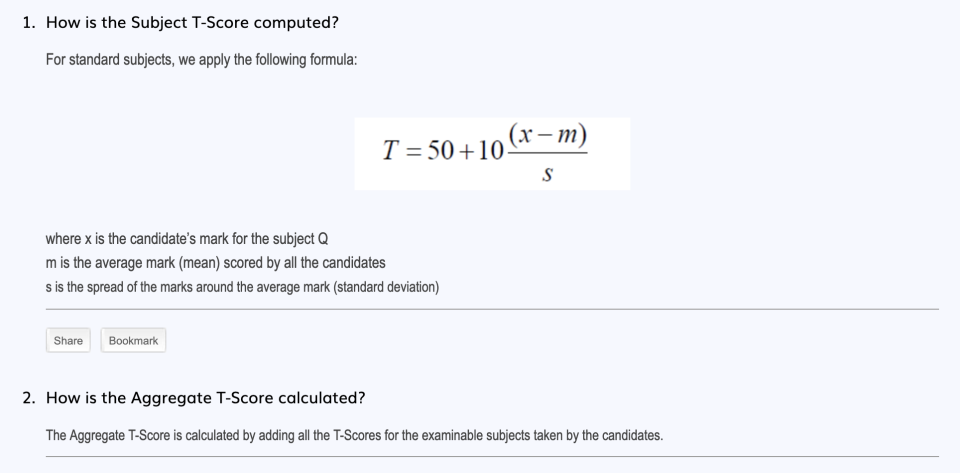
Impact on parents, students
However, he stressed that the new system, even with its increased flexibility, will not have a uniformed impact among parents and students.
“For one, there is a certain group of parents out there with very high educational aspirations for their children. They only want the most prestigious secondary schools – for their own reasons,” added Prof Jason Tan.
The new system will not dissuade such parents from ensuring that their children take all four subjects at the Standard level, to increase their chances of getting into those schools, he added.
For instance, to get admission into the Express stream, a student will need to take at least one Standard level subject, providing he scores well in all four subjects.
Prof Jason Tan believes that the new system will have the most effect on the “vast” middle segment of parents, who will have to think more carefully about the mixture of subjects taken at Standard or Foundation levels.
“Much more responsibility will be put on parents and students to make a wise choice, because more schools will be clustered around the same mark range and that choice order will play a large part too,” he said.
School teachers will also have to step up to the task of educating parents and students about the finer points in their decision-making process, Prof Jason Tan added.
“(The process) requires research. It requires a social network of friends, colleagues and so on. And chat groups to exchange views about various schools...or attending open houses,” he said.
“Not all the parents out there are equally well-placed to engage in this kind of strategic decision making.”
Dr Chinnu Palannivelu, a father to a son and daughter who are Primary 6 and Primary 3 students in Teck Ghee Primary School, respectively, agreed that the new changes are a right move for Singapore's education system.
However, the managing partner of accounting firm Stamford Assurance noted that it is "extremely hard" for a student to move to Express if they have to take at least two Foundation level subjects.
"Only top students are able to score As (75 marks or higher) in Foundation level subjects...More resources have to be allocated to level up weaker students," said Dr Chinnu.
Related stories:
Budget 2019 debate: Subject-Based Banding to replace streaming in secondary schools by 2024
Remove streaming in secondary schools to reduce social stratification: Louis Ng


